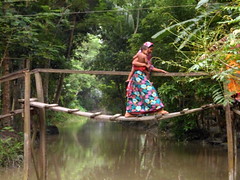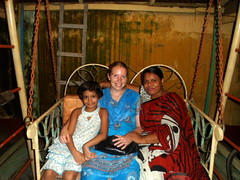Most of my fellowship has taken place in Dhaka, a city that can overwhelm you with its traffic, hot weather and crowds. It is home to both sprawling slums and the largest shopping mall in South Asia. People come to the city in search of economic opportunities, and Dhaka has become so vast that it’s easy to forget that almost 80% of Bangladesh’s population still lives in rural areas. I spent the last week celebrating Eid in Barisal where I caught a glimpse of how people cope with disabilities.
I found myself standing outside of BERDO’s office struggling with the lock and sweating profusely despite the fact that it was only 8 am. I decided to inquire with the neighbor to see if she knew anything about the lock and was immediately offered tea and a seat directly in front of her fan. Although our verbal communication was limited, I could see the grimace of pain on her face from an ankle injury that had not received proper medical care. I then watched as the woman’s mother crawled out of her room and with the help of her granddaughter hoisted herself up on a chair to sit. The elderly women had lost the ability to use her legs and had no wheelchair or other mobility device to help her navigate the small home. Even though I could tell that she too was in pain, the exchange of glances between the woman and her grandchild made me think that she was as well cared for as she could be given the circumstances.
When someone finally came to open the office door and I left the small home, my thoughts were on the importance of family in Bangladesh. I think that people here cope with disability and just about everything that comes their way by being there for their families. I am sure that a heavy care giving burden fell upon the young girl in the family that I met, but I was happy to see them together and to see how much they cared for each other. They coped with disability not with crutches or wheelchairs or government or NGO assistance (although I will try to see if BERDO can get them a wheelchair) but by being there for each other and staying grounded in their faith.
I did not take a picture of the family in my story but did include a photo of me with two members of the Huq family in Barisal.
Posted By Amanda Lasik
Posted Sep 6th, 2011



